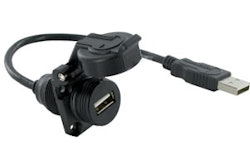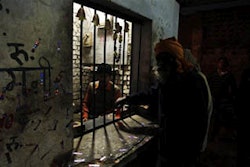FLAGSTAFF, Ariz. (AP) — Disposable plastic water bottles in shops, vending machines, hotels and grocery stores at Grand Canyon National Park will disappear early next year under a plan by park officials to ban the sale of them.
But first they'll have to demonstrate they've met guidelines issued late Wednesday by the National Park Service that require a review of water availability, visitor health and safety, cost and benefits, and get the approval of the regional director. Grand Canyon spokeswoman Shannan Marcak said Thursday that the park believes it already is positioned to comply with the guidelines.
"We need to fully review it, and it takes a little time to figure out if we have all those things covered," she said.
Park Service director Jon Jarvis nixed a bottle ban at Grand Canyon late last year just weeks before it was to be implemented and said the agency would develop a national policy. Former Grand Canyon Superintendent Steve Martin raised suspicions that the action was due to influence from the Coca-Cola Co. — a major water bottle distributor — but the Park Service and Coca-Cola denied that.
"While superintendents need some discretion to tailor implementation to local situations, it is not the purview of any one park to set policy," Jarvis wrote Wednesday in memo to regional directors.
Marcak said Grand Canyon has been encouraging visitors to ditch disposable bottles in favor of reusable ones and to fill them at one of nearly a dozen water stations on the north and south rims that were installed at a cost of more than $300,000. She said the park hadn't yet gathered data to show whether the year-long effort resulted in a decrease in park waste, 30 percent of which is made up of disposable plastic water bottles.
Chris Lane, vice president of environmental affairs for Grand Canyon concessionaire Xanterra Parks and Resorts, said reducing sales of the bottles is a hit to revenue, but it's a direction the company has been moving for years. It has set up hydration stations at the Grand Canyon and pushed visitors to use reusable containers while looking for biodegradable alternatives to plastic.
"We're not perfect at education; we've got competing interests," he said. "Obviously we want to make a profit, but we also want people to do the right thing."
Nearly 100,000 people had signed a petition organized by 5 Gyres, which researches the impact of plastic pollution in waterways, and Change.org urging Jarvis to ban the bottles from parks nationwide. Stiv Wilson, a spokesman for 5 Gyres, said the groups mobilized against what they saw as a backroom deal in which the beverage industry denied sustainability efforts in public parks.
"I put my faith in the superintendents of the parks because they are the people on the ground dealing with pollution firsthand," he said. "People get into that position because they love the space they're working in. Giving the power back to those people is a very positive development."
Zion and Hawaii Volcanoes national parks have instituted bans similar to the one proposed at the Grand Canyon, which gets 4.5 million visitors a year. The Park Service said those parks also would have to show in writing that the new guidelines are met and evaluate the bans annually.






















